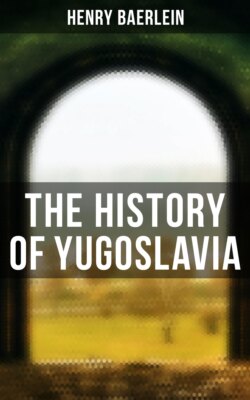Читать книгу The History of Yugoslavia - Henry Baerlein - Страница 79
На сайте Литреса книга снята с продажи.
THE CHEERLESS STATE OF SERBIA
ОглавлениеMeanwhile the Serbs of Hungary were saying that the state of things in Serbia was desperate. It seemed so to a number of young men who found the coldness of Prince Alexander and his anxiety to please the Austrians both very much out of harmony with the new Liberal ideas of Western Europe. They would have been horrified to see the plight of Macedonia, which after the Crimean War became, if possible, still worse, for during it the Porte took up the first loan; others followed, and in a surprisingly short time the Turk stood face to face with bankruptcy, so that in his dealings with the peasant he became still more extortionate. To be sure the Liberal young men who were publishing the Omladinac and all those Southern Slavs who listened to the voices which in Italy and Germany were craving union and freedom, all of them saw in their dreams the freedom of the Southern Slav, but Serbia and Montenegro were the only portions of his patrimony which had any kind of independence and the Serbia of Alexander was in a distressing state. The Prince had managed to stay neutral during the Crimean War, in spite of the solicitations very vehemently put by Austria and Russia and the Porte; this neutral attitude secured for Serbia at the peace the benefit of having all her rights henceforward guaranteed collectively by the Great Powers. Yet Alexander was so anxious not to rouse the animosity of Austria that he declined to summon the national assembly, the Skupština, in which the people's rising aspirations could be heard. And, although the family community, the "zadruga," was giving way to a more modern way of life—much to the misgiving of those persons who believed that strength lay rather in the union of thirty or forty people, under the authority of the head of the house, than in a more dispersed society which would encourage individual initiative—yet Serbia was still a semi-Turkish and a quite despotic country, with all the civil service largely filled by Serbs from Hungary and many of the higher offices in the possession of the relatives of the Princess, for Alexander's wife, a lady from the neighbourhood of Valjevo, was as celebrated for her cleverness as for her beauty. It is regrettable that she did not prefer to take in hand the women's legal status, which is still too much like that of minors. When the princely pair had been expelled in 1858 and Miloš, to his infinite delight, called back from Bucharest, his place of exile, there was yet a great deal for the Omladina enthusiasts to do. Miloš at the age of seventy-eight was senile; he would sit for hours outside his old, white Turkish house at Čačak, while the passers-by knelt down to kiss his hand; in church he would become oblivious to his surroundings and would garrulously talk in a loud voice to friends around him.
